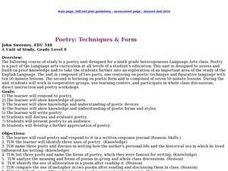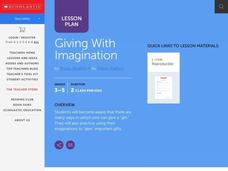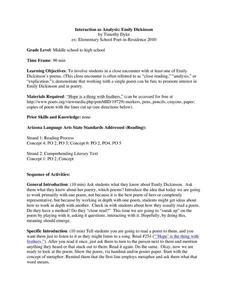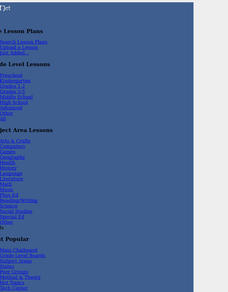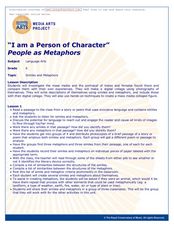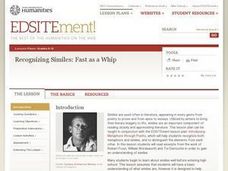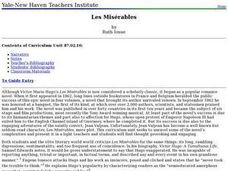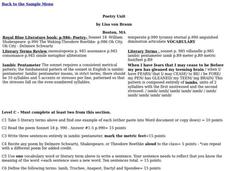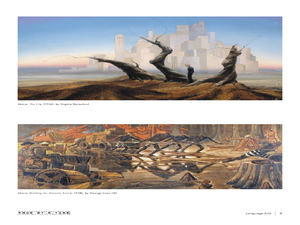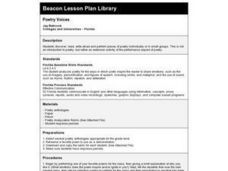Curated OER
Poetry: Techniques & Form
Ninth graders explore poetic technique and figurative language in this ten lesson unit. Comparisons are made between a variety of forms of poetic expressions and the lives of several poets are studied.
Curated OER
A Simile and Metaphor Lesson
Students use their knowledge of similes and metaphors to analyze poetry. In this poetry and language lesson, students read examples of similes and metaphors and write their own examples that describe their city, television, or an era in...
Curated OER
Figurative Language
What is figurative language, and why do we use it? Introduce your high schoolers to some examples and discuss the importance of including this element in your writing. After studying a text and searching for examples, writers will...
Curated OER
Giving with Imagination
Demonstrate gift giving as an act of caring about someone versus gifts for show (or gifts from the purse). Elementary learners practice giving gifts from the heart by creating a poem for someone special to them.
Curated OER
What's the Deal With Nature?
Twelfth graders read the poem "Crossing the Swamp" and "Pipefish" then discuss the use of metaphor in each poem. They write a poem about how they feel about school using a nature metaphor.
Curated OER
Don Quixote
Students examine the use of metaphors in literature. In this literary devices lesson, students read poems that feature extended metaphors and compare them to the metaphors used in Don Quixote. Students then try their hand at writing...
Curated OER
Still I Rise: Maya Angelou
Students read the poem, Still I rise, by Maya Angelou. They examine how language, poetic devices, and format contribute to the poet's message. They identify poetic devices used in the poem.
Curated OER
Interaction as Analysis: Emily Dickinson
Emily Dickinson’s “Hope is a thing with feathers” is the focus of a series of activities that model for learners how close reading can lead to understanding. The whole class plays with the metaphor, groups talk about the author’s...
BBC
The Role of a Monarch (key stage 2 and 3)
What makes a good monarch? Elementary and middle schoolers examine popular symbols of the British monarchy before designing a television advertisement about the qualities needed in a monarch. Next, they write poems using metaphors and...
Curated OER
Modern American Poetry
Students identify different types of literary terms in poems. They read different poems and create a packet summarizing them. They write a poem of their own and a biography of one of their favorite poets.
Curated OER
I Am a Person on Character
Sixth graders explore the portrayal of males and females in mass media. For this language arts lesson, 6th graders create a digital collage and write a description about themselves using similes and metaphors.
Curated OER
Recognizing Similes: Fast as a Whip
Students review basic knowledge of similes and engage with similes on a more abstract level. In this similes lesson, students define similes and identify examples. Students read and analyze the similes used in poetry by Derricotte,...
Curated OER
The Nature of Haiku Poetry
Students brainstorm elements of nature art prints and photos. They identify the syllable count of Haiku and take a nature walk. They write Haiku poems while practicing the use of simile, alliteration, metaphor, and analogy to describe...
Curated OER
Lines Composed a Few Miles Above Tintern Abbey
Twelfth graders read lyrics for "My Hometown" and complete a worksheet to identify setting and tone in the song. In this Romanticism lesson, 12th graders read Lines Composed a Few Miles Above Tintern Abbey by Wordsworth and discuss...
Curated OER
Focus On Figurative Language in Prose
Students examine the use of literary prose in the story, "Dark They Were, and Golden-Eyed." In this literary prose activity, students investigate the use of imagery, metaphor, and simile in the story. They tell how author's purpose is...
Curated OER
Les Mis'rables
Learners read, understand, and enjoy Les Miserables. They improve their skills in literary analysis, writing, and listening. Through the study of biblical and historical allusions, symbols, metaphors, and other figurative language, they...
Curated OER
Poetry Unit
Students, after examining three forms of poetry, review and document a variety of literary terms. Vocabulary words are enveloped into the literary terms as well and are cited from each selection by each student.
Curated OER
Art Analysis and Creative Writing
Students write an acrostic poem and analyze a work of art. In this art lesson plan, students look at a picture and answer questions about it, write a poem, write about the setting in the painting they saw, and answer short questions...
Curated OER
Making Connections: I Know Why Caged Birds Sing
Students discuss equality and fairness by reading a Maya Angelo poem. In this U.S. history lesson, students read the poem I Know Why Caged Birds Sing, and discuss how the era it was written in affected the words. Students...
Curated OER
Valerie Bloom Poetry
Students listen to Granny Is, a poem by Valerie Bloom and discuss the metaphors in the poem. In this poetry lesson, students read poetry written by Valerie Bloom and discuss the techniques she uses. Students write grandmother poems.
Curated OER
Figurative Language in Poetry and Prose
Students examine the impact of sound devices in poetry. In this poetry lesson plan, students read the listed poems and identify uses of hyperbole, simile, metaphor, imagery, and personification. Students discuss how sound devices enhance...
Curated OER
An Introduction to Poetry Using Color
Students complete a variety of poems that focus on many different literary techniques and styles. As part of this experience, students share their portfolios with adults in the school and at home.
Curated OER
Classic Poetry
Fifth graders review the terms narrative and classic poetry. They are introduced to SMUGGLER'S SONG and compare the structure to recently read poetry. They join in on the refrain reading the story together as a class.
Curated OER
Poetry Voices
Students investigate the performance aspect of poetry by reading, writing and discussing poetry pieces.


